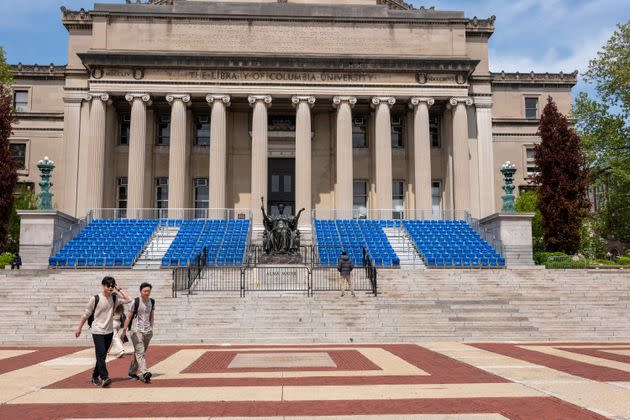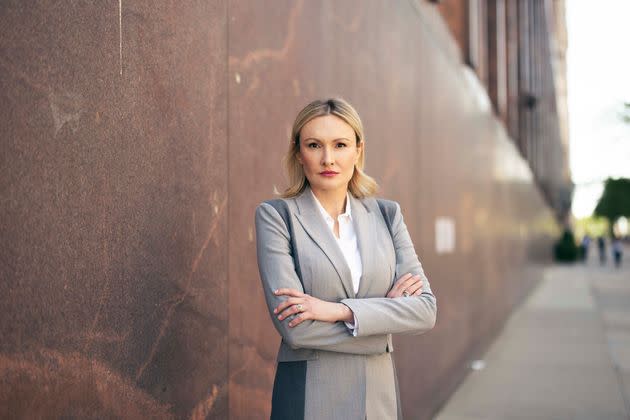Columbia Professor Says School Discriminated Against Her For Being Muslim
- Oops!Something went wrong.Please try again later.

NEW YORK — Amra Sabic-El-Rayess is a genocide survivor, born and raised in Bosnia, where at least 100,000 people were killed. She was a teen when she lived under complete military siege, unable to go to school under the threat of bombs.
Bosnian Serb forces systematically executed as many as 8,000 Bosnian Muslim males in Srebrenica — the largest massacre in Europe since the Holocaust. Women and girls were systematically gang-raped and assaulted. Every day, civilians were tortured, starved and murdered.
In 1995, Sabic-El-Rayess received a scholarship to emigrate to the U.S. She graduated from Brown University and became the first Muslim president of the university’s alumni association in its 258-year history.
She earned her Ph.D. in Comparative and International Education at Columbia University and shortly thereafter joined as a lecturer for the university’s Teachers College. Since then, she has traveled the world to deliver presentations and talks on hate prevention and education. In 2021, President Joe Biden penned a letter to Sabic-El Rayess, telling her he was “inspired” by her “bravery and strength” and that she embodied the “very idea of America” after reading her memoir.
However, she believes it was not enough for the department heads at Columbia. In a lawsuit filed in federal court last month, Sabic-El-Rayess alleged that she was repeatedly denied the opportunity to become a tenured professor at the university’s Teachers College because of both her Muslim religion and her age.
“I survived the Bosnian genocide. I know what hate feels like. I know where hate can take a society. The one love that I had from America was that I wouldn’t be seen as someone who is the other,” she told HuffPost. “I was reminded that I was the other.”
A spokesperson for Columbia denied the claims raised in her lawsuit in a statement to HuffPost this week.
“Dr. Amra Sabic-El-Rayess is a valued member of our TC community. We reject the claims made in Dr. Sabic-El-Rayess’s lawsuit and deny the allegations of discrimination. We will present our case in a court of law,” a spokesperson for Teachers College, Columbia, told HuffPost in an email.

After completing her master’s and doctorate degrees at Columbia in 2012, Sabic-El-Rayess was recruited to join Teachers College, the graduate school for education at Columbia, as a lecturer. For 10 years, she taught students and designed over 20 courses that focused on the prevention of violence targeting people due to their race, ethnicity or faith. In 2020, she launched an international interfaith research lab in which she researched, studied, and trained students and faculty alike on the dangers of bigotry and hate.
In an interview with HuffPost, Sabic-El-Rayess’ golden highlights framed her face as she folded her perfectly manicured hands. Her soft pink nails matched her lipstick as she sat up with her back straight. She spoke gracefully, rarely elevating her tone, recounting the pain she’s felt at her university.
She echoed criticisms that Columbia University has faced over the last month as protests wracked the campus and were met twice with police crackdowns — that one of the most prestigious universities in the world and the fifth-oldest university in the country fell painfully short of its commitment to antiracism and diversity.
“We live in one of the most diverse cities in the United States of America. We have students from all over the world. A big proportion of our students are international students. We have faculty members of all backgrounds,” said Sabic-El-Rayess. “But we have never had a tenured or tenure-track Teachers College faculty member who is Muslim. Why?”
Sabic-El-Rayess has published dozens of peer-reviewed articles, published two nonfiction books and wrote for news outlets including USA Today and Al Jazeera. She’s traveled the world to present her research, including the U.K., South Korea and Australia. Earlier this month, she returned from a trip from Oslo, Norway, where she spoke at a conference about the transnational impact of hate.
Her accomplishments did not go unnoticed. In addition to the note from Biden, her publications won several awards. She brought more than $10 million of research funding to Teachers College. The university beamed at her accomplishments, promoting and applauding her work publicly.
However, Sabic-El-Rayess was not tenured at Columbia, meaning her job was still at risk. Tenured professors are secured in their full-time employment, whereas lecturers are employed by contracts that need to be reviewed and approved by the administration after a set amount of years. Tenured professors also receive a slew of benefits, including higher pay and health care. Most notably, tenured professors have the security of academic freedom and scholarly independence without fear of being fired because of the nature of their work.
There are two ways for a professor to achieve tenure status: through a formal application or a target of opportunity hire, where an outstanding applicant is hired into the tenure track. Sabic-El-Rayess formally applied for tenure twice, beginning in December 2012.
During that process, she received what she said was an uncomfortable email from a colleague, according to the lawsuit. The hiring committee asked her colleague “about diversity,” he said in an email to her, according to the lawsuit. The colleague said that if she were brought up as Muslim, he would “communicate that to the search committee as one additional dimension of diversity.” She responded yes.
But the request spooked her. She taught courses about Islam and spoke about the dangers of her experience as a survivor of the Bosnia genocide in presentations and through her published works, but how well she taught or conducted research“had nothing to do with whether I’m a Muslim or not. And I knew it was wrong. But I was scared to say it was wrong. I was terrified.”
Weeks later, she learned she was rejected without a reason, according to the lawsuit. She applied again the following year, 2013, and told HuffPost she was denied again without explanation.
Columbia did not respond to HuffPost’s follow-up questions.
Frustrated, in 2014, Sabic-El-Rayess met with the then-department chair to ask how she could improve her chances of being promoted to a tenured professor. The chair acknowledged her accomplishments, she told HuffPost. But according to the suit, the chair told her that her Muslim identity makes it difficult for her to receive full support from the university.
In 2016, she became an associate professor, the highest non-tenure position she could attain. For years, as she noted in her lawsuit, she watched as the department promoted other tenured professors, none Muslim, and none she believed were as accomplished as her.
“The underlying message is clear,” she said. “As a Muslim, we don’t want you here in a capacity that is equal to non-Muslims.”
It wasn’t only the rejections. Sabic-El-Rayess said that over the years after her rejections, she faced unfair scrutiny over her courses about Muslims and Islam, with the review committee tasked with approving new courses and questioning the “relevance and importance” of one of her courses in 2018.
In another instance cited in the lawsuit, she notified leadership after a colleague tweeted that graduation caps “dangerously” resembled a fez, a traditional hat often worn by Muslim men. In 2021, one Muslim student was discouraged from taking her course, according to the lawsuit, with another professor telling her that her course “just says Islam is great and Muslims are not terrorists. You probably know more than the professor!”
Sabic-El-Rayess sent emails to the president and the interim provost at the time, which were reviewed by HuffPost. In these emails, she detailed what she said were her discriminatory experiences with staff, reiterated her accomplishments, and questioned the lack of support for a tenure-tracked position.

“I have been told because I am Muslim, I will never [be] supported for tenure at TC, and I have been asked, in writing, in the midst of a hiring practice if I’m a practicing Muslim,” she wrote in the April 2023 email to the interim provost reviewed by HuffPost.
“No meaningful action has ever been taken in my response to reporting anti-Muslim racism because, as I have come to realize through my experience, such prejudice is normalized and accepted at TC.”
She’s sent dozens of emails and met with various colleagues, peers and members of the administration, all of whom are listed in the lawsuit, all to no avail. Instead, the university reduced her salary last year, according to the lawsuit, in what she described as another form of retaliation for speaking out.
Columbia did not respond to HuffPost’s question about the salary reduction.
“No matter how hard I worked, no matter how much I gave of myself to the institution, to its people, to my colleagues, to the students, I was never from their perspective in terms of promotion and recognizing and respect, I was never equal,” she said.
She filed a $10 million lawsuit in the southern district of New York last month as a last resort. The university will respond to the lawsuit in June. Until then, she continues to teach on campus, motivated by the reason she began to teach in this field — a desire to see change and end discrimination.
“The institution is happy to parade me, this individual who has had a major contribution in terms of innovation and research and all of that. They’ve used my work to uplift themselves as the institution,” she said. “But the message internally to me has always been clear. No matter what you accomplish, you will never open that door. You will never walk through that door.”
